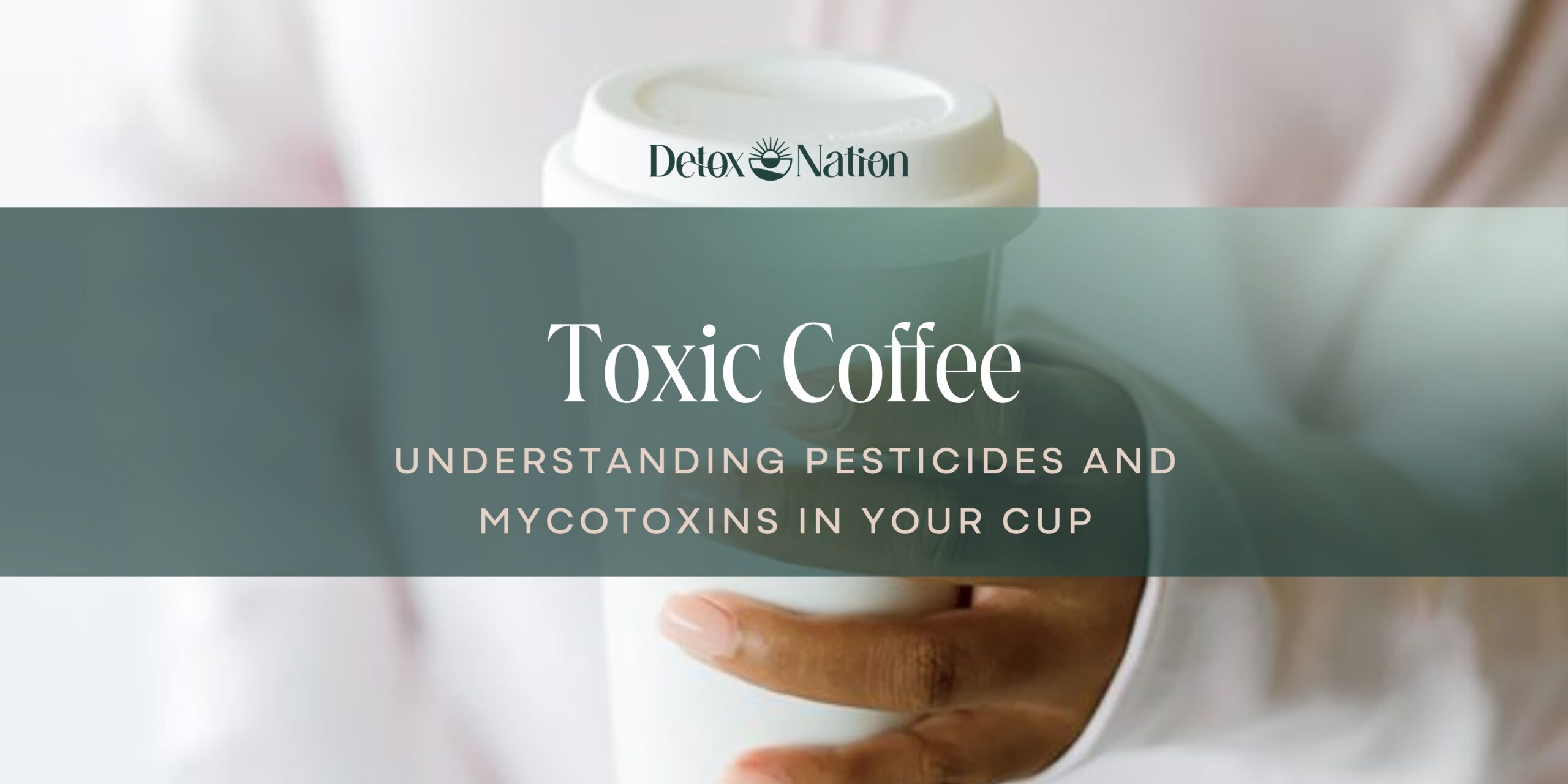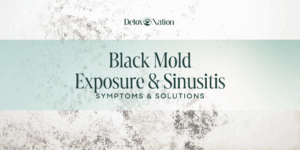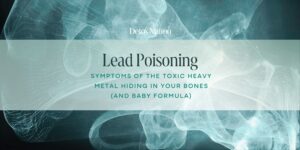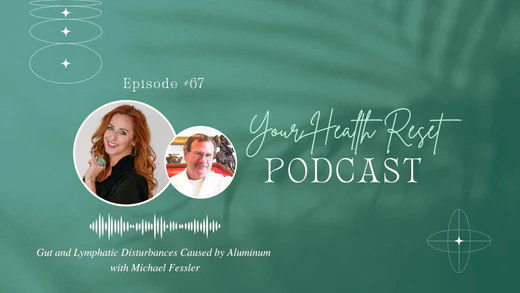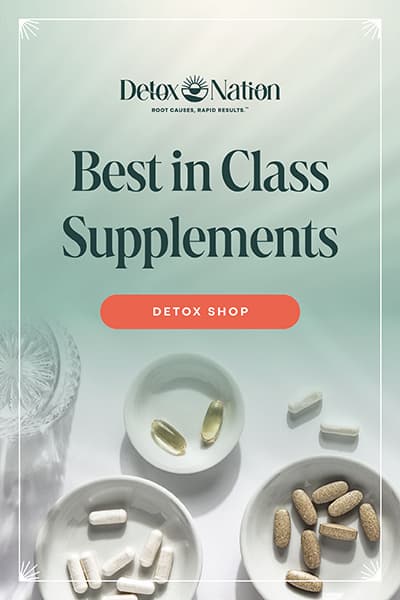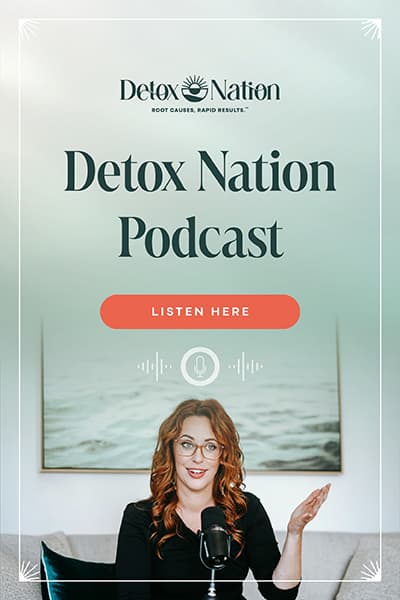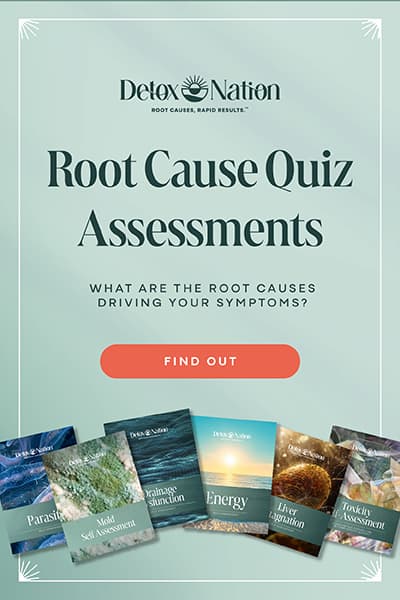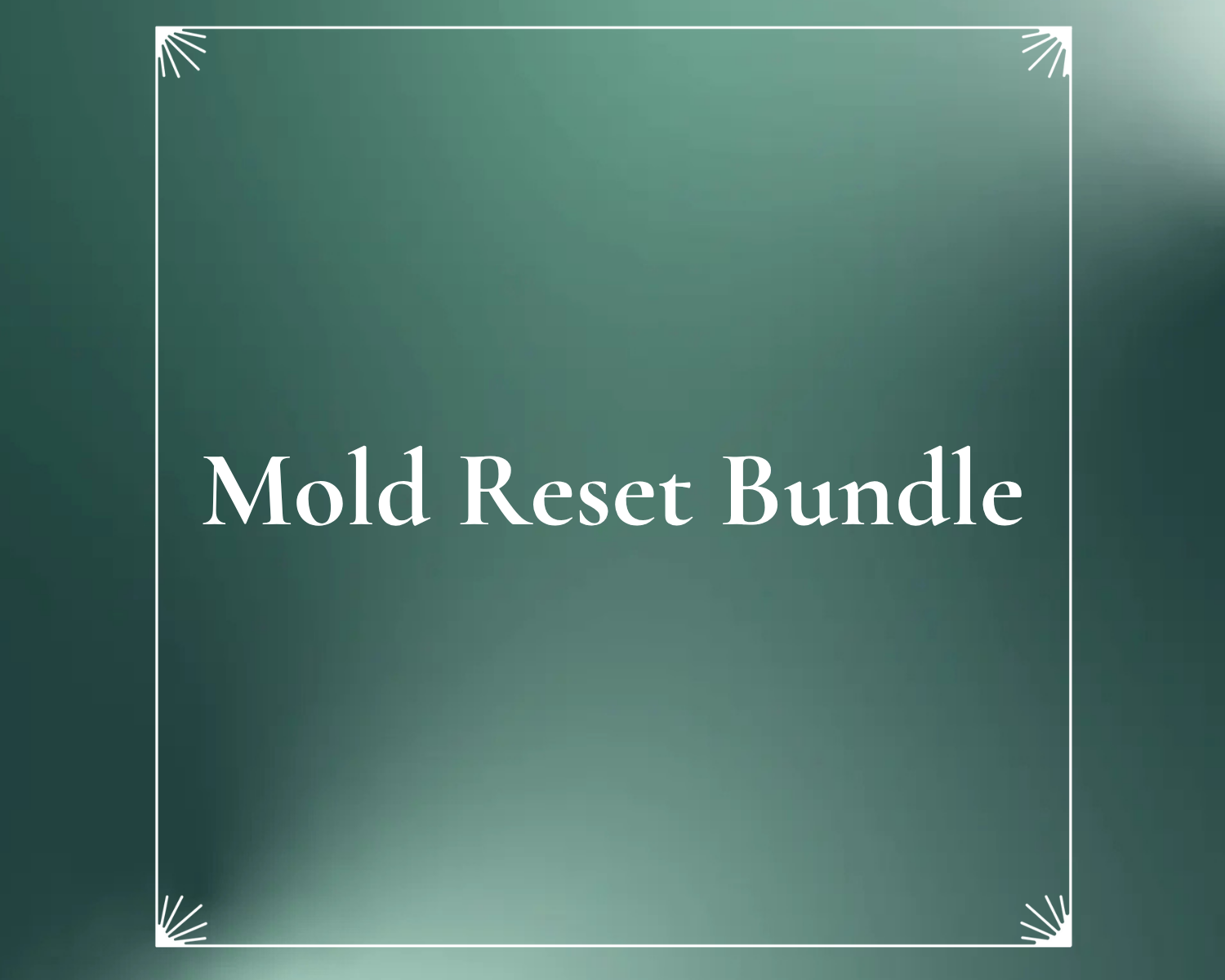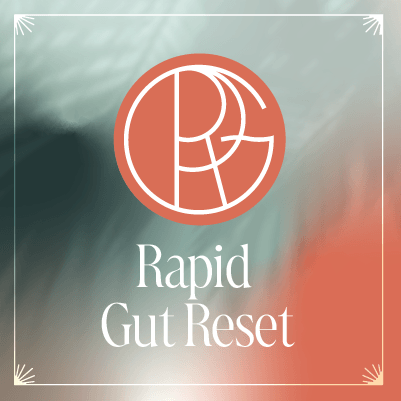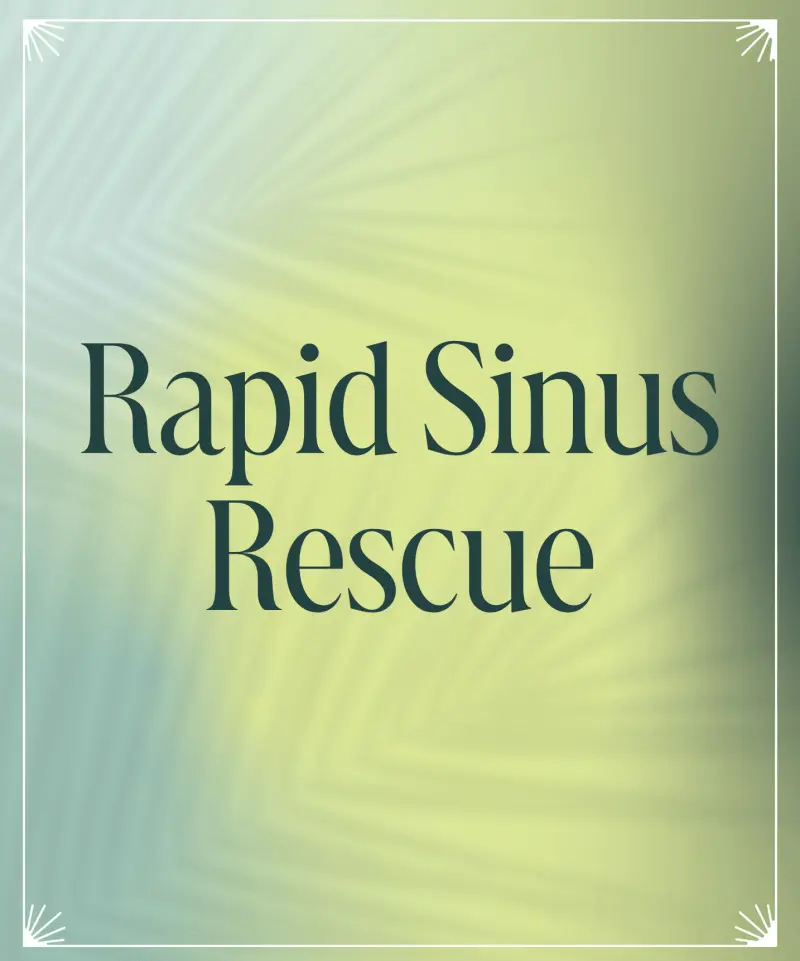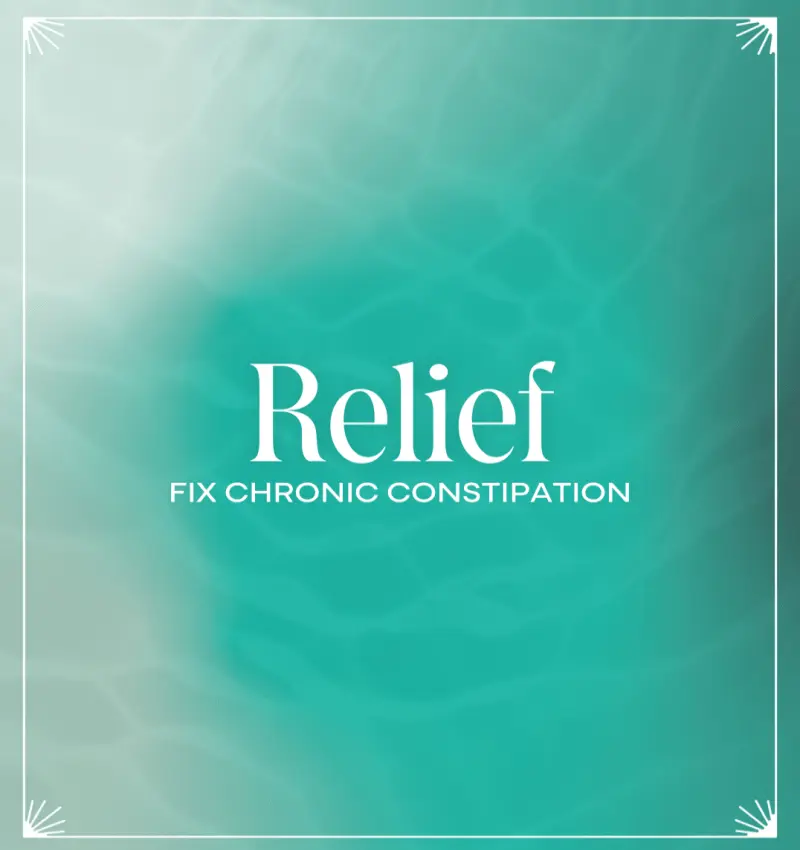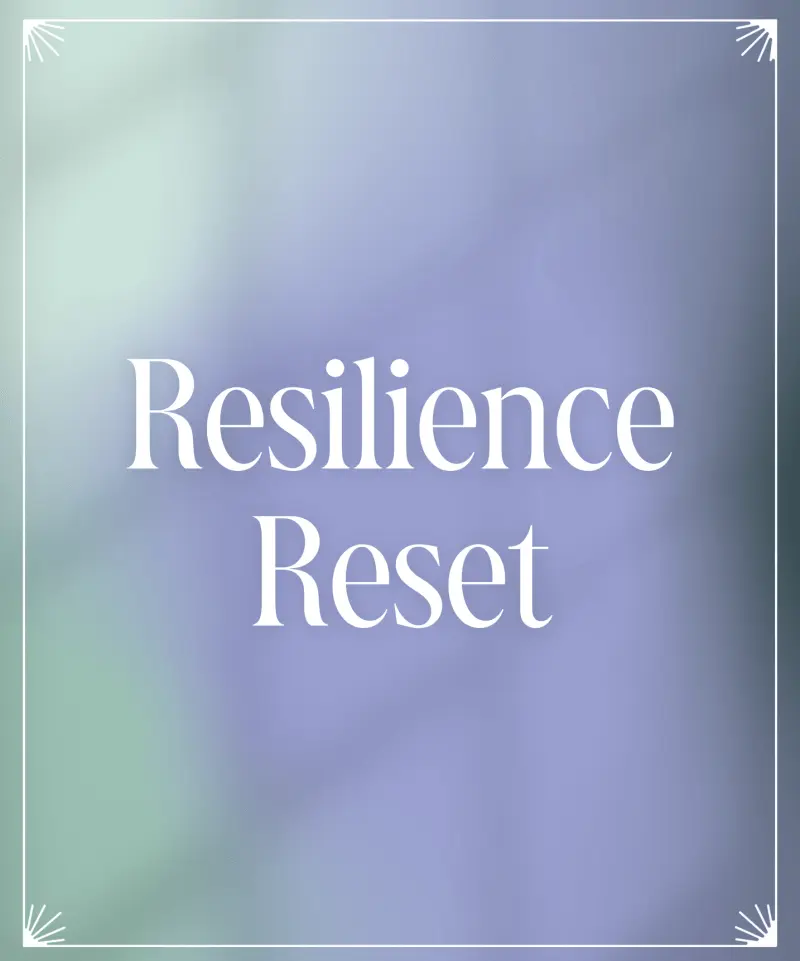Are you ready for the toxic truth about coffee and some easy swaps you can make to protect yourself? From pesticides to mold and heavy metals, toxins in coffee abound in your morning cup. And let’s not forget about the pods, paper cups and milks. Learn how to transform toxic coffee into a healthy habit!
Ahhhh coffee—the divine nectar of productivity, the reason I’m upright right now, and occasionally, my therapist in a cup!
But what if I told you that this magical potion might be more “toxic” than you think?
No, it’s not just your over-caffeinated heart palpitations talking—it’s science.
Yes, your beloved coffee could be harboring hidden dangers, from carcinogenic compounds formed during roasting, to sneaky chemicals leaching out of packaging, and even mold hitching a ride along the way.
But don’t panic, I’m not about to tell you to give up coffee altogether (because honestly, what’s the point of life without it?).
You can still sip your coffee without compromising your health.
All it takes are a few swaps—because while you can’t control the beans’ past (unfortunately, we’re not in charge of coffee farm policies), you can choose a healthier path forward.
Let’s get into the nitty-gritty so you can keep enjoying your daily “cup of joe” without any of the toxic baggage.
Key Takeaways
- Coffee can be toxic.
- Health concerns include chemical toxins, heavy metals, mold, and more.
- Some simple swaps can turn your daily coffee into part of your health routine.
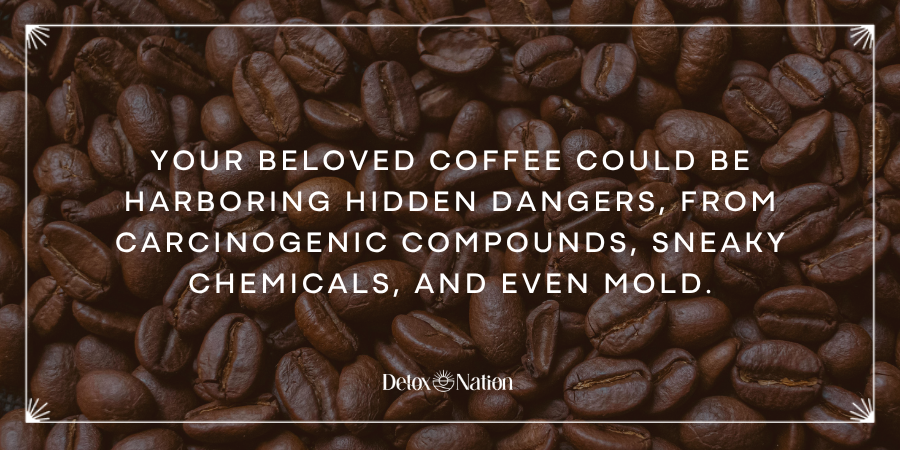
Coffee’s Dirty Secrets
Knowledge is power, so let’s start by looking “behind the curtain” at some of coffee’s dirty secrets: Chemicals, metals, and mold.
Polycyclic Aromatic Hydrocarbons
Polycyclic aromatic hydrocarbons (PAHs) are compounds that can form when coffee beans are roasted at high temperatures (11, 13, 15).
They are suspected carcinogens and genotoxins, meaning they can potentially cause cancer and DNA mutations (13, 15).
Examples of PAHs include Acrylamide, Furan, and Advanced Glycation End Products (AGEs). (11) You may have heard of that last one – they are infamous for being the reason why you shouldn’t burn or char your meats!
Let’s take a closer look at acrylamide, a known toxin (6). In 1994, the International Agency for Research on Cancer declared it a “probable carcinogen.” (10, 15)
It’s classified as neurotoxic and genotoxic, and it causes mitochondrial dysfunction (10, 15).
Reducing your coffee intake (perish the thought!) or choosing lighter roasts can help minimize PAH exposure.
Also, being mindful of how your coffee is sourced and prepared is beneficial. (More on this in the next section!)
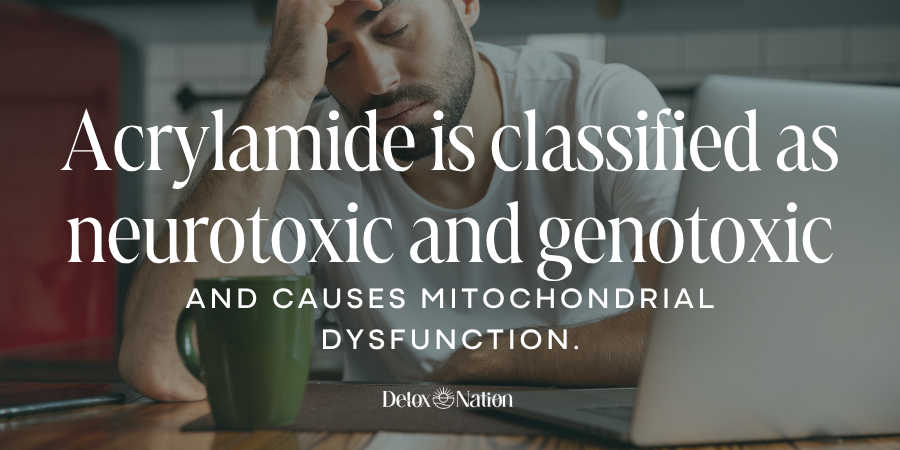
Phthalates
Phthalates are chemicals used in plastics, and they can leach into coffee through packaging or brewing equipment (2, 3, 15).
You know, like the plastic-lined paper cups or the plastic coffee pods that seem to be in Every. Single. Office.
Even worse, exposure to heat increases the likelihood that phthalates will transfer into your coffee (2).
Phthalates are known endocrine disruptors (30).
Endocrine disruptors cause chronic subclinical inflammation, gut dysbiosis, and they destroy hormonal balance (30). They’re also known to promote obesity.
A recent study found Endocrine Disruptors “even at low doses may promote epigenetic transgenerational inheritance of adult obesity in subsequent generations (30).”
Yup. You read that right.
Your consumption of low doses of chemicals like phthalates can promote obesity in your kids and grandkids.
To avoid phthalate exposure, ditch the paper or plastic cups and use glass or stainless-steel containers.
If you use a plastic coffee maker, consider switching to one made from safer materials like metal or glass.
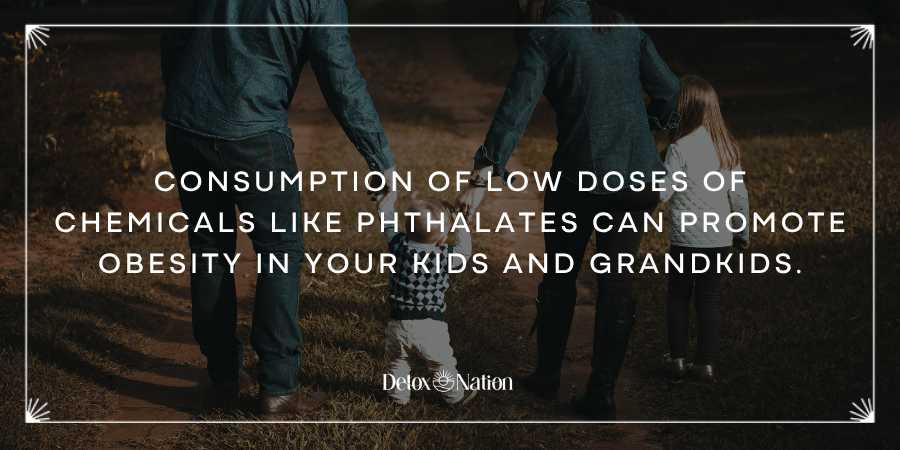
Pesticides and Herbicides
Coffee farming often involves the use of pesticides and herbicides, including glyphosate and atrazine, to protect crops from insects, weeds, and disease (15, 29).
Conventional coffee crops are often sprayed with the pesticide chlorpyrifos, a known neurotoxin. Additionally, it’s been banned in the US for personal use because it causes birth defects – so why is it still allowed to be used commercially (29)?
In fact, there are eighteen toxic chemicals commonly used individually or in combination as pesticides or herbicides on coffee crops (29)!
Pesticides can cause a wide variety of health issues including Parkinson’s, endocrine disruption, reproductive disorders, cardiovascular disorders, and neuropathies (15).
These chemicals can linger on coffee beans and ingesting them over time may lead to health risks and symptoms (15).
Choosing organic coffee is a good way to reduce your exposure to pesticides since it’s grown without synthetic pesticides.
Heavy Metals
Some coffee can contain heavy metals like lead, nickel, cadmium, and arsenic (3, 4, 8).
These metals find their way into coffee during the growing process or through contaminated water and soil (5, 15, 31) and cause serious health problems with long-term exposure.
In general, heavy metals cause inflammation, oxidative stress, and DNA damage that then lead to a host of other chronic symptoms (31).
For example, metals can interfere with sperm production, cause sperm DNA damage, impair sperm motility, and cause “testicular toxicity.” (3)
Buy coffee from reputable brands that test for these contaminants and ensure water quality during processing.
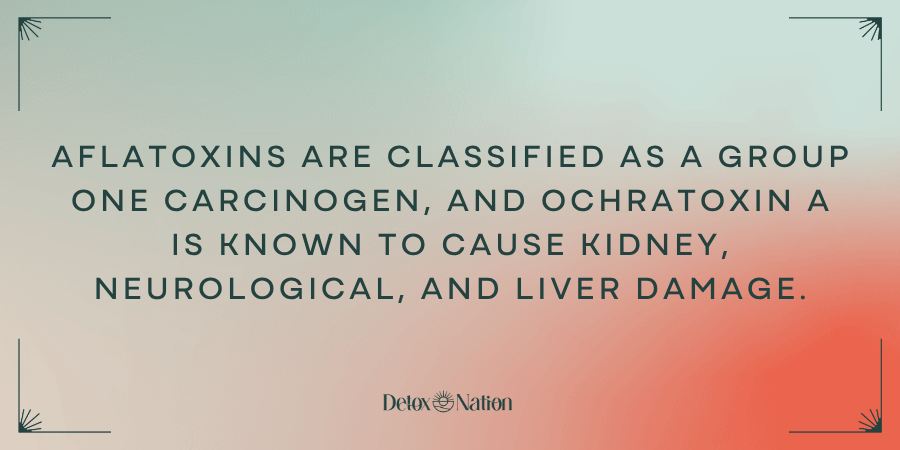
Mold
Gross! Who wants to drink moldy coffee?
Mold can grow on coffee beans when they are improperly stored at any point in the chain, leading to the production of toxins like aflatoxin and ochratoxin A.
Aflatoxins are classified as a Group One Carcinogen (15).
Ochratoxin A is known to cause kidney, neurological, and liver damage as well as other health issues (14, 15).
To avoid moldy coffee, store beans in a cool, dry place and consume them quickly.
Only support brands that test their products for mold and toxins to ensure you’re drinking a safe cup.
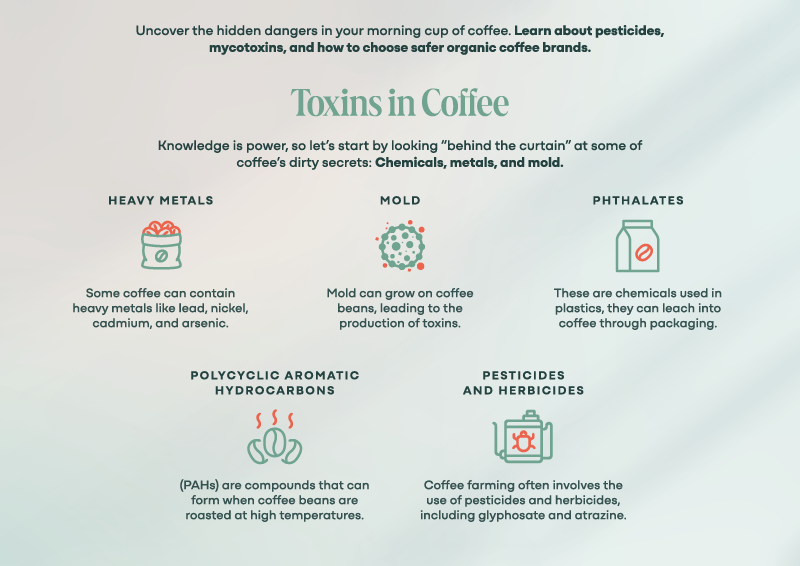
More Concerns with Toxic Coffee
Choosing the right coffee can lower your exposure to toxins. Understanding which factors affect toxicity, like roasting levels and the bean’s altitude, can help make your coffee less toxic and more enjoyable.
The Roast Matters
The way the coffee is roasted can influence its toxicity.
Light roast beans have more chlorogenic acid (which is good for your health) and they also create less exposure to PAH’s.
However, light roast beans might contain higher levels of quinic acid when brewed.
This can make your coffee taste more sour or bitter and might lead to stomach discomfort.
Dark roast coffee has less chlorogenic acid because it’s broken-down during roasting, so some people might find it to be easier on the stomach.
They often have a smoother taste due to reduced acetic and citric acids.
Balancing taste, acidity, and exposure to PAHs can improve your coffee experience significantly.
Altitude
Coffee grown at higher altitudes tends to be less toxic.
Arabica beans, which are commonly grown in high-altitude regions, are known for having a smoother taste and fewer toxins compared to robusta beans (29).
Don’t worry! This isn’t a geography quiz!
So you don’t have to consult your atlas, some higher elevation countries include Columbia, Ethiopia, Guatemala, Kenya, Papua New Guinea, and Sulawesi (29).
The cooler temperatures in these regions slow the growth of the beans, which can lead to less exposure to harmful molds that thrive in warmer climates (29).
Also, coffee cherries take longer to mature at high altitudes.
This results in beans with complex flavors and lower levels of unwanted compounds.
Next time, check if your coffee is labeled as high-altitude, as this usually indicates a higher quality product.
Decaf Dilemma
Decaf coffee often has more toxins compared to regular coffee because the decaffeination process can involve solvents such as methylene chloride, ethyl acetate, and/or trichloroethylene (29).
Trichloroethylene is also used to dry clean clothes and degrease engines and has been linked to Parkinson’s Disease (9).
But hey, that’s convenient. You can use your coffee to degrease your engine. (Insert eye roll here.)
During the decaffeination process, the coffee loses caffeine but might retain or increase levels of mycotoxins.
Notably, aflatoxins can be found in green coffee beans and might be more concentrated in decaf varieties.
Pay attention to how your coffee is processed and choose options that prioritize your health.
Now that we’ve explored some of the things that make coffee toxic, let’s look at the issues with convenience items such as coffee pods and paper cups.
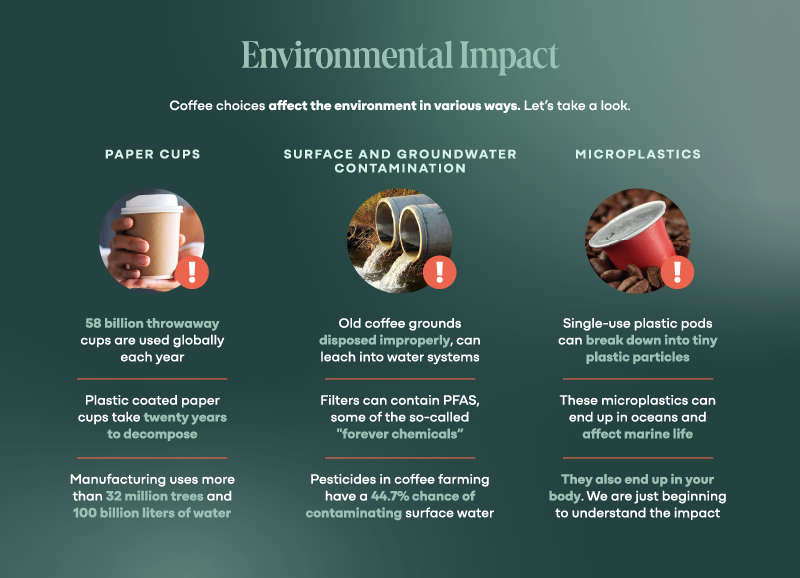
The Toxic Truth About Coffee Pods
Coffee pods offer convenience, but they bring some health concerns. Key issues like the presence of harmful chemicals such as BPA and the risk of aluminum leaching are important to consider.
BPA and Phthalates
Coffee pods often contain plastics that hold Bisphenol A (BPA) and phthalates.
These are chemicals used to make plastics flexible, but they can seep into your coffee (15).
BPA and phthalates are linked to health concerns like hormonal imbalances because they can mimic hormones in the body. (Hello, endocrine disruptors!)
When hot water flows through a pod, it may cause these substances to leach out.
This means your coffee could become a source of unwanted chemicals in your body.
It can also become an unwanted source of chemicals in the environment as plastic pods can take hundreds of years to break down.
In 2014 (over TEN years ago), an estimated NINE BILLION pods ended up in landfills (2). I can’t even begin to imagine what that number is today.
Aluminum Leaching
Many coffee pods are made with an aluminum lining.
While aluminum is lightweight and helps protect freshness, it does pose health concerns.
Aluminum is a well-documented neurotoxin, and is associated with Parkinson’s, Alzheimer’s, Multiple Sclerosis, Autism, and more (32).
And that doesn’t even include the impact of Aluminum on the gut microbiome, immune system, and intestinal permeability (33)!
When exposed to hot water, aluminum can leach into your coffee and into your body.
Between the toxins involved in growing and processing coffee beans and the chemicals found in coffee pods, we can see the detrimental impact poor coffee choices can have on your health. (Thank goodness these are alllll fixable with different choices!)
But what about the impact on the environment?
Environmental Impact
Coffee choices affect the environment in various ways. Let’s take a look.
Paper Cups
Every day, many people use paper cups for convenience, but these often have a plastic lining for waterproofing.
This lining, usually made from polyethylene, makes it hard to recycle them.
Let’s look at some statistics:
- At least 58 billion throwaway cups are used globally each year (16).
- Paper cup manufacturing uses more than 32 million trees and 100 billion liters of water – and emits more greenhouse gasses than half a million cars (16).
- The US uses about 136 million cups per day! For comparison, China only uses 27.4 million cups per day (19).
- Paper coffee cups are used for an average of thirteen minutes, and less than 1% of coffee cups are recycled worldwide (19).
- Plastic coated paper cups take twenty years to decompose in landfills (19).
How We Can Help
Guiding people to reclaim their health and vitality is our greatest joy. Our entire practice is dedicated to supporting you to be who you really are, at home in your body, because your body is able to heal itself.
Book A CallInstead of paper or plastic, choose glass or stainless-steel mugs. Many coffee shops even offer discounts when you bring your own cup.
By making a small change, you decrease waste, help the planet, and reduce your exposure to toxic chemicals, heavy metals, and mold. Sounds like a win-win-win to me!
Surface and Groundwater Contamination
Coffee production and waste contribute to surface and groundwater pollution.
In one study, the use of pesticides in coffee bean farming had a “44.7% chance of contaminating surface water, and a 23.7% chance of contaminating groundwater (15).”
Even old coffee grounds and their contaminants, when disposed improperly, can leach into water systems.
The use of pre-ground coffee in single-use filters adds to this issue, as filters can contain PFAS, some of the so-called “forever chemicals.”
Make some of the swaps we’ve already discussed and look for ways to compost your coffee grounds, rather than throwing them away.
Microplastics
Microplastics are a growing concern with coffee, especially when using single-use plastic pods and disposable plastic cups (15).
These pods, commonly lined with polyethylene, can break down into tiny plastic particles.
These microplastics can end up in oceans and affect marine life.
They also end up in your body – and researchers are just beginning to understand the impact this may have on your health.
Switching to alternative brewing methods can help mitigate this impact.
French presses or pour-over systems don’t rely on plastic-lined pods.
By choosing these methods, you help reduce the spread of microplastics while still enjoying your favorite beverage.
So far, we’ve looked at the coffee itself and what it’s served in. Now we need to address what it’s served with to round out this part of the conversation. (And then – I PROMISE – we’ll get to the good news!)
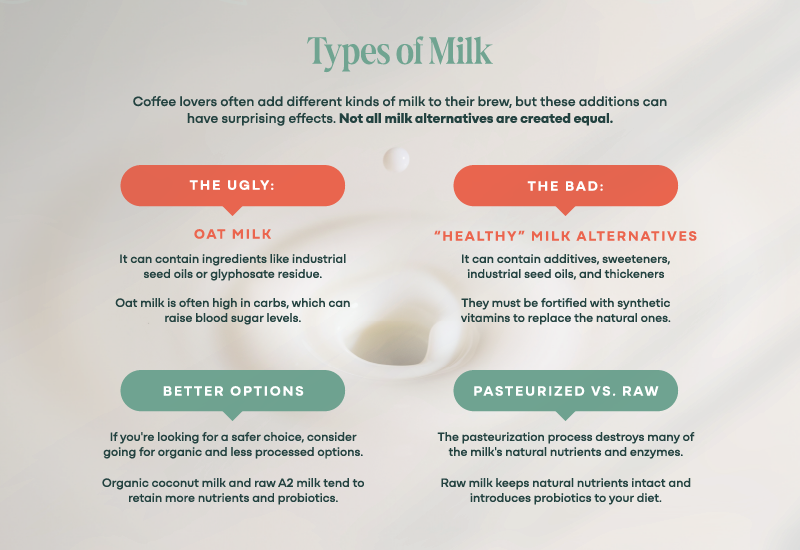
Toxic Coffee Additions: The Good, The Bad, and the Ugly
Coffee lovers often add different kinds of milk to their brew, but these additions can have surprising effects. Not all milk alternatives are created equal.
The Ugly: Oat Milk
Oat milk, although popular, is not as healthy as you think.
While it’s a creamy addition to your coffee, it can contain ingredients like industrial seed oils or glyphosate residue, which is used in farming as an herbicide and as a drying agent (27, 28).
These residues might trigger inflammation or affect your gut health.
Additionally, oat milk is often high in carbs, which can raise blood sugar levels and may not be ideal for everyone.
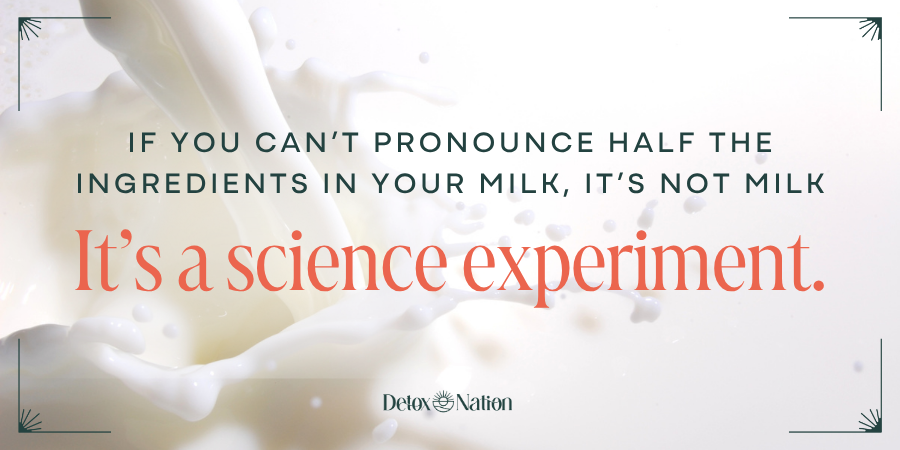
The Bad: “Healthy” Milk Alternatives
Nut milks and other plant-based milks are marketed as healthy alternatives, but they have their downsides.
- Many store-bought versions contain additives, sweeteners, industrial seed oils, and thickeners that might lead to digestive issues or other health issues.
- They can also be inflammatory for some people, potentially affecting your gut microbiome.
- They often must be fortified with synthetic vitamins to replace the natural ones lost in processing.
Let’s look at some of the so-called “healthy” milk alternatives:
- Almond milk is often made from GMO crops and conventional almonds may be pasteurized with propylene oxide, a probable carcinogen (28).
- Cashew milk contains sugars that could add unneeded calories to your coffee.
- Rice Milk is considered to be the least allergenic milk alternative, but it can be laced with inorganic arsenic (a known carcinogen) due to the farming practices involved. Also, it can dramatically spike your blood sugar (28).
- Soy Milk is made from GMO crops that may contain high amounts of glyphosate (a probable carcinogen) (28). Soy is also a plant-estrogen and most of us don’t need more estrogen!
If you can’t pronounce half the ingredients in your milk, it’s not milk – it’s a science experiment!
Better Options
If you’re looking for a safer choice, consider going for organic and less processed options.
Organic coconut milk and raw A2 milk are two possibilities.
They tend to retain more nutrients and probiotics, which can be beneficial for your overall health.
A2 milk contains A2 beta-casein which is more easily digested than the A1 beta-casein in “regular” milk (20, 21, 22, 23).
Additionally, A1 beta-casein is associated with diabetes, heart disease, and GI issues (20, 21, 22, 23)
Raw goat milk or camel milk might also be worth trying if you want to explore something new.
Camel milk has high nutritional content, low allergenicity, and is easily digested (24).
While these options might be more expensive, they can be better for maintaining a balanced diet and avoiding unnecessary additives.
Pasteurized vs. Raw Milk
Pasteurized milk is standard in most stores, but the pasteurization process destroys many of the milk’s natural nutrients and enzymes.
It then has to be fortified with synthetic nutrients.
The heating process also “denatures” the proteins in milk, making them change shape.
On the other hand, raw milk keeps natural nutrients intact and introduces probiotics to your diet, which can boost digestion and help foster a balanced gut microbiome.
But always ensure raw milk is sourced from reputable places to minimize health risks.
Now it’s time to flip the script and look at the health benefits of coffee, and how you can level up your game to turn your morning coffee into a powerful wellness habit!
The Silver Lining: Coffee’s Benefits
Coffee isn’t just a comforting morning ritual. It offers real health perks, including antioxidants that combat stress, improved mental clarity, and supportive digestive properties.
Antioxidants and Polyphenols
Coffee is packed with antioxidants and polyphenols.
You know how an avocado turns brown faster than my coffee gets cold when I forget to drink it?
That’s oxidation at work—free radicals causing damage.
Antioxidants are like the squeeze of lemon juice you put on the avocado to keep it green and fresh. Basically, they’re the body’s defense squad against turning into a rusty mess.
Polyphenols are the reason your blueberries are blue, your spinach is green, and your wine is red—they’re natural protective compounds that give plants their vibrant colors and health benefits.
When you eat them, they pass that goodness and their protective benefits on to you. I’m still holding out hope they’ll also make me as photogenic as a berry bowl.
Drinking coffee daily means you’re not just getting a caffeine boost but are also protecting your body’s cells with antioxidants and polyphenols. Go you!
Brain Function, Focus, and Mood
Coffee has been shown to boost brain function.
The laser-beam focus and lift in your spirits isn’t just in your head; it’s an actual benefit of your “morning mud.”
The caffeine in coffee blocks adenosine, a neurotransmitter that makes you feel tired. This results in improved alertness and concentration.
Regular consumption may also lower the risk of neurodegenerative diseases, providing both short-term and long-term cognitive benefits (7).
So, coffee isn’t only about waking up; it supports your brain health too.
Metabolism
Coffee can be a friend to your metabolism. Java Juice, anyone?
Caffeine increases metabolic rate and supports fat burning, making it a popular choice in weight management.
By stimulating a thermogenic response, coffee helps in burning more calories even at rest.
Digestive Aid
Coffee offers digestive benefits by acting as a mild digestive aid.
It stimulates bile production, which is essential for digesting fats, and can help regulate gastric acid secretion.
This can lead to better digestion and improved bowel movement.
Coffee also has compounds that may support gut health, making it an interesting option for those with digestive concerns.
Coffee enemas can be a powerful addition to your wellness routine, but that’s a conversation for another time!
Thank goodness coffee has cool health benefits—because there’s no way I was giving it up anyway!
Even better, you can turbocharge your coffee’s wellness game by adding more interesting things than just cream and sugar.
Power Up Your Coffee
Taking your coffee to the next level can enhance its benefits. You can add ingredients that boost energy, support metabolism, and offer unique health advantages. These additions not only make your coffee richer in flavor but also make it more functional.
Shilajit
Shilajit is a natural substance often used in Ayurvedic medicine.
Known for its rich content of fulvic acid, it is believed to boost energy, improve stamina, reduce fatigue, support cognition, and aid in detoxification. (25, 26)
Yes, please!
It is recognized to have at least twelve biological activities, including the ability to detoxify almost a dozen heavy metals (25).
You can think of it as a secret weapon for your morning brew.
Simply dissolve a small amount of this earthy substance in your coffee for best results.
Collagen Peptides
Collagen peptides are a fantastic add-in if you’re all about boosting skin elasticity and keeping your joints feeling smooth—because why not make aging look and feel amazing?
Peptides – the building blocks of amino acids and proteins – dissolve easily and won’t change the taste or texture of your coffee.
By including them in your daily routine, you may notice stronger nails, healthier skin, and better joint comfort.
Collagen is also helpful for digestive health, making it perfect for those who are mindful of digestive disorders. Just mix a scoop into your coffee, and you’re good to go!
Ceylon Cinnamon
Ceylon cinnamon is more than just a yummy spice to put in your apple pie.
It has properties that help with blood sugar regulation and cardiovascular health, making it a smart coffee addition (34).
This cinnamon type is often called “true cinnamon” and has a delicate flavor.
Sprinkle a dash of Ceylon cinnamon into your cup for a sweet, aromatic experience.
Besides adding a comforting spice note, it can help keep your blood sugar more balanced throughout the day.
Adaptogens
Think of adaptogens as your body’s stress thermostat—they help regulate your response to whatever life throws at you.
Whether you’re running on empty or totally wired, they adjust to give you what you need.
Honestly, I wish they could work on my to-do list too.
Some popular choices are ashwagandha and mushrooms like Lion’s Mane, Reishi, or Turkey Tail.
Ashwagandha is neuro-, cardio-, and hepato-protective and reduces inflammation (35). It can improve memory, attention, and executive function (36).
Medicinal mushrooms are immunomodulatory, antioxidant, and anti-inflammatory (37).
These can give your coffee a stress-reducing punch and potentially enhance mental clarity.
Start by adding a small amount of powdered adaptogens to your coffee. These generally have a mild taste and blend well with coffee, offering calmness without drowsiness.
MCT or Coconut Oil
MCT oil or coconut oil can transform your coffee into a creamy delight while providing a brain-boosting effect.
These oils are known for enhancing metabolism. They’re also popular in keto diets for energy support.
To use, just blend a tablespoon of MCT or coconut oil into your coffee. This mix creates a frothy texture and smooth taste, providing a satisfying, rich flavor.
Final Tips and Takeaways
When it comes to enjoying your coffee, making a few simple changes can help make it less toxic and more delightful.
Focus on improving your routine and checking some essential points to enhance both taste and health.
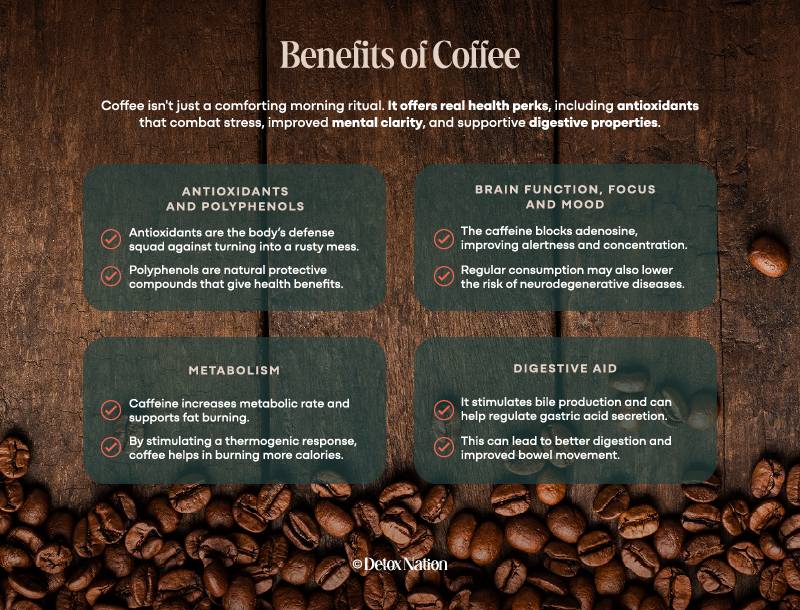
Reframe Your Ritual
Rethink how you make your coffee each day.
Opt for organic or single-origin beans; they are often free from harmful chemicals and offer a cleaner taste.
Choose beans that are shade-grown and mold-tested for a healthier brew.
Consider using a French press made of stainless steel to keep your coffee free from plastics often found in other brewers.
Use distilled water for brewing since it helps eliminate impurities that can add unwanted elements to your cup.
Strategically select your coffee additions for health benefits and flavor.
Treating coffee as a part of your self-care routine can transform your daily habit into a moment of calm.
Your New Coffee Checklist
When preparing coffee, consistency is key.
- Avoid coffee pods, instant coffee, and paper cups – Check!
- Choose organic, mold-free arabica beans from high elevations – Check!
- Find a few reusable mugs that suit you – Check!
- Swap out chemical creamers, and not-so-great milk options for organic coconut milk or raw A2 milk – Check!
- Add shilajit, Ceylon cinnamon, adaptogens, or MCT oil – Check!
- Opt for natural sweeteners or go without sugar to keep your coffee healthier.

Finally, My Favorite Coffee Brands
I get this question a lot.
Like, really, a lot.
So here you go – my favorite coffee brands are Purity Coffee, Lifeboost Coffee, and Danger Coffee. (Be sure to click on the links to get a discount code you can use if you decide to try one of these awesome coffees! While I may receive a small commission, there’s no extra cost to you. I only recommend products I personally love.)
The goal isn’t to make coffee complicated; it’s to make it something you’ll enjoy AND feel good about.
Because life is too short for bad coffee – or bad health. You’ve got this!
How We Can Help
Guiding people to reclaim their health and vitality is our greatest joy. Our entire practice is dedicated to supporting you to be who you really are, at home in your body, because your body is able to heal itself.
Book A CallFrequently Asked Questions
Coffee can be a delicious part of your day, but making some small changes can improve its health benefits.
What’s the healthiest way to sweeten my coffee?
To sweeten your coffee without adding empty calories, try using natural sweeteners like stevia or monk fruit. You can also try raw honey or maple syrup. These choices can enhance flavor while being kinder to your health.
How can I make my morning coffee boost last longer?
To prolong the energy boost from your morning coffee, try pairing it with a balanced breakfast that includes proteins and healthy fats. Eating with your coffee can help stabilize blood sugar and keep you energized longer. Additionally, staying hydrated by drinking water throughout the day can support your energy levels.
Can you suggest ways to make coffee that’s easier on my stomach?
If coffee tends to upset your stomach, there are a few ways to make it gentler. Using dark roast beans or making a cold brew can reduce acidity. Adding a splash of milk or a pinch of baking soda can neutralize some of the acids and make your coffee more pleasant.
How should I adjust my coffee habit to be more hormone friendly?
To make your coffee habit more hormone friendly, consider cutting down on caffeine by mixing in some adaptogens. Drinking your coffee after breakfast, rather than first thing in the morning, can help your body manage cortisol levels better. Organic coffee may also help you avoid hormone disruptors often found in non-organic coffee.

